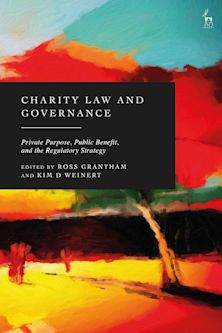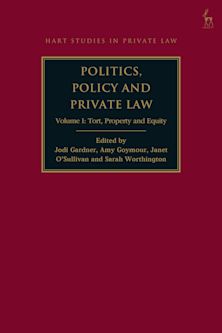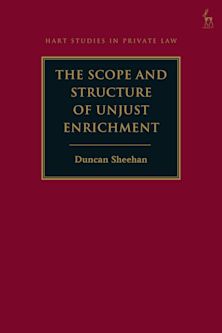- Home
- ACADEMIC
- Law
- Equity and Trusts
- Rationalising Constructive Trusts
You must sign in to add this item to your wishlist. Please sign in or create an account
Description
Constructive trusts significantly interfere with the rights of an apparent legal owner of property. This makes it necessary for their imposition to be properly explained and justified. Unfortunately, attempts to rationalise constructive trusts as a whole-as opposed to specific doctrines or particular aspects of constructive trusts-have been few and far between.
Rationalising Constructive Trusts proposes a new structure for a coherent understanding of constructive trusts. By using a combination of conceptual tools, it provides answers to a number of crucial questions, for example: What are the ingredients of a constructive trust claim? What are the limits of constructive trusts? How can we rationalise the imposition of constructive trusts in particular situations? Why do judges exercise varying degrees of remedial discretion in different doctrines?
From a wider perspective, the structured understanding helps us to appreciate the precise ambit and role of express, constructive, and resulting trusts.
Table of Contents
PART A
2. Building Blocks
3. The Structure of the Law of Constructive Trusts
PART B
4. The Doctrine in Rochefoucauld v Boustead
5. Secret Trusts
6. The Doctrine in Pallant v Morgan
7. Proprietary Estoppel
8. Specifically Enforceable Contracts of Sale and Future Property
9. The Rule in Re Rose
10. Gains Made In Breach of Fiduciary Duty
11. Remedial Constructive Trusts
PART C
12. Mutual Wills
13. The Quistclose Doctrine
14. The 'Common Intention Constructive Trusts'
15. Donatio Mortis Causa
16. Conclusion
Product details
| Published | 21 Sep 2017 |
|---|---|
| Format | Ebook (PDF) |
| Edition | 1st |
| Extent | 408 |
| ISBN | 9781509917082 |
| Imprint | Hart Publishing |
| Series | Hart Studies in Private Law |
| Publisher | Bloomsbury Publishing |
About the contributors
Reviews
-
This highly analytical work is to be commended. Its comprehensive approach embraces court decisions and scholars' views across a variety of jurisdictions and generations. It also clearly explains the advantages or deficiencies of each of the orthodox views, before putting forward the author's own theory on the subject.
Dixon Siu Chung Tse, The Modern Law Review
-
Liew has valuable insights to offer on each of the varieties of constructive trust he discusses. Although firmly grounded in English law, his arguments are supported by a wealth of authority drawn from all common law jurisdictions. The quality of academic literature on constructive trusts is high, and this scholarly work is a worthy addition to the genre. It can be warmly recommended to anyone with an interest in the rational development of the law of trusts.
Michael Bryan, University of Melbourne, Journal of Equity
-
... it should be of interest to Canadian lawyers with a deep interest in trusts and it will be of practical use to Canadian lawyers dealing with a novel issue in one of the areas of law analysed in the book. For example, one topic that is of particular interest from a Canadian perspective is that of proprietary estoppel... The analysis provided by Dr. Ying Khai Liew should provide assistance to Canadian lawyers looking for insights on the application of proprietary estoppel in Canadian law.
Tim Youdan, Estates, Trusts & Pensions Journal
-
[T]his book is a deep dive into the vast and murky waters of one of the most challenging areas of the laws of trusts and equitable remedies. The author courageously takes on the task of bringing order and structure to the area and, for the most part, succeeds in discharging the promise in the book's title ... it is a worthy addition to an already well-stocked canon of high-quality literature on this difficult but essential topic.
Nuncio D'Angelo, Australian Law Journal

ONLINE RESOURCES
Bloomsbury Collections
This book is available on Bloomsbury Collections where your library has access.


































